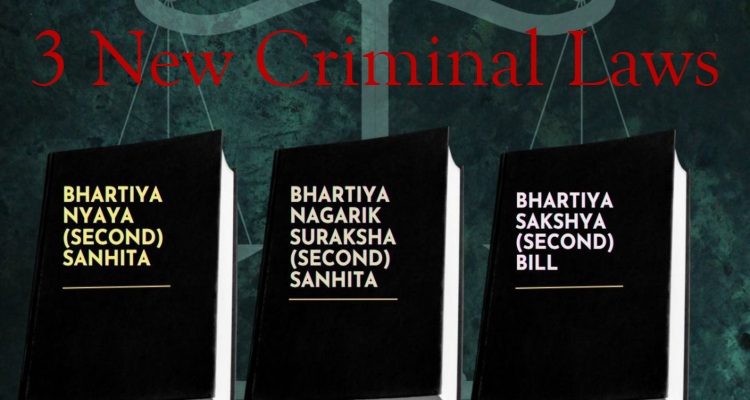BNS 2023 replaced Indian Penal Code 1860, incorporating 358 sections, with maintain most IPC provisions, introducing new offences, eliminating court-struck offences, enhancing penalties for various offences.
New Offences:
- Promise to Marry: Criminalizing “deceitful” promises to marry.
- Mob Lynching: Codify offences linked to mob lynching and hate crime murders.
- Organized crime and Terrorism: broader scope for terror financing in BNS compared to UAPA.
- Attempt to Suicide: Criminalizes attempts to commit suicide with intent to compel or restrain public servant from discharging official duty.
- Community Service: Added as possible form of punishment.
Deletion:
- Unnatural Sexual Offences: Section 377 of IPC, which criminalized homosexuality among other “unnatural” sexual activities repealed completely.
- Adultery: Offence of Adultery omitted in consonance of Apex Court Judgment
- Thugs: Section 310 of IPC fully omitted
- Gender Neutrality: Laws dealing with Children modified to bring gender neutrality.
Modifications:
- Fake News: Criminalization of publishing false and misleading information.
- Sedition: Introduced under a new name ‘deshdroh’ with wider definition.
- Mandatory Minimum Sentence: Some provisions with Mandatory Minimum Sentence may limit scope for judicial discretion.
- Damage to Public Property: Carry graded fine then fine equal to the amount of damage caused.
- Death by Negligence: Elevated punishment for causing death by negligence from 2 to 5 years.
Take on Organised Crime: A new chapter in the Criminal Justice System
A dedicated section has been introduced in Bhartiya Nyaya Sanhita 2023 to combat organized crime, ensuring no room for unlawful activities orchestrated by syndicates, which pose a grave threat to the internal security of the country.
Section 111 of the Bhartiya Nyaya Sanhita 2023 defines organized crime and targets a range of offences including kidnapping, robbery, cyber-crimes, and more.
Offences which were either not clearly defined or non-existent in previous statute have been introduced in Section 112, which clearly includes offences such as snatching, shoplifting, betting or gambling and selling examination papers,
Activities committed individually or by organized crime syndicates, using violence, threats, or coercion are now punishable offences.
Key Issues:
- Criminal Responsibility Age Discrepancy: Criminal Responsibility starts at seven, extendable to 12 based on maturity, potentially conflicting with global recommendations.
- Inconsistencies in Child Offense Definitions: It sets child age below 18, but age criteria for offenses like rape differ, causing inconsistency.
- Retention of IPC provisions on Rape and sexual Harassment: Maintains IPC provisions on rape and sexual harassment, omitting Justice Verma Committee’s 2013 suggestions for gender-neutral rape and recognizing marital rape as an offence.
Cyber Fraud FIR in Mumbai under BNS:
A food vendor from Girgaum, who was the victim of a cybercrime, became the first Mumbaikar whose complaint was registeres under the new criminal law, BNS, on Monday. Mumbai police registered 12 FIRs, besides some non-cognisable complaints, under BNS on the first day of its implementation across country. With exception of some teething trouble, police said they did not face problems handling cases under the new laws as they had been trained extensively.
Broadening scope of Organised Crime:
Compared to MCOCA and GujCOCA, the BNS has changed the definition of “organised crime” in a number of ways. First off, “continuing unlawful activity” was defined under the MCOCA and GujCOCA as any unlawful action that is a cognisable offence punishable by three or more years in jail and for which more than one charge sheet has been submitted in the previous ten years. The BNS, however, has expanded the definition of ongoing illegal activity by enshrining all crimes that are punishable by law within its jurisdiction.
Second, the definition of organised crime now includes the phrase “by the effort of groups of individuals acting in concert,” which sets it apart from MCOCA and GujCOCA. It is unclear if this establishes a further condition for the organisation’s members to have a common intention to carry out that specific ongoing illegal behaviour or if it only relates to the shared goal that the people have simply by virtue of belonging to the group.
Thirdly, any ongoing illegal conduct that results in a direct or indirect material profit, including financial gain, is classified as organised crime by BNS. Although the term “material benefit” remains undefined, “benefit” is defined as “anything of benefit to a person, whether or not it has any inherent or tangible value, purpose, or attribute” in the explanation to Cl. 109. The definition of organised crime under the BNS may be significantly expanded as a result of such a broad and ambiguous meaning.
BY – APARNA SINGH KSHATRIYA


Their international health forums provide crucial insights.
how to get generic lisinopril without insurance
They have a fantastic range of supplements.
Definitely imagine that that you stated. Your favorite reason seemed to be at the web the easiest factor to remember of. I say to you, I certainly get irked whilst folks consider concerns that they plainly do not realize about. You controlled to hit the nail upon the highest and also defined out the entire thing with no need side effect , other people could take a signal. Will likely be again to get more. Thank you
https://t.me/s/pt1win/48
Актуальные рейтинги лицензионных онлайн-казино по выплатам, бонусам, минимальным депозитам и крипте — без воды и купленной мишуры. Только площадки, которые проходят живой отбор по деньгам, условиям и опыту игроков.
Следить за обновлениями можно здесь: https://t.me/s/reitingcasino
https://t.me/s/iGaming_live/4613
https://t.me/iGaming_live/4658
https://t.me/s/reyting_topcazino/14
https://t.me/of_1xbet/251
https://t.me/s/ef_beef
https://t.me/s/beEFCASiNo_OffICiAlS
https://t.me/s/Martin_casino_officials